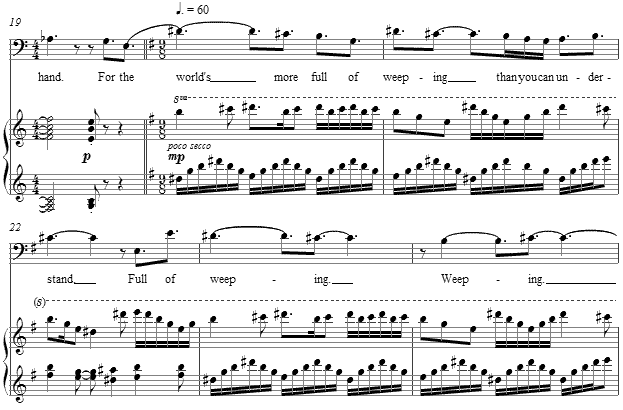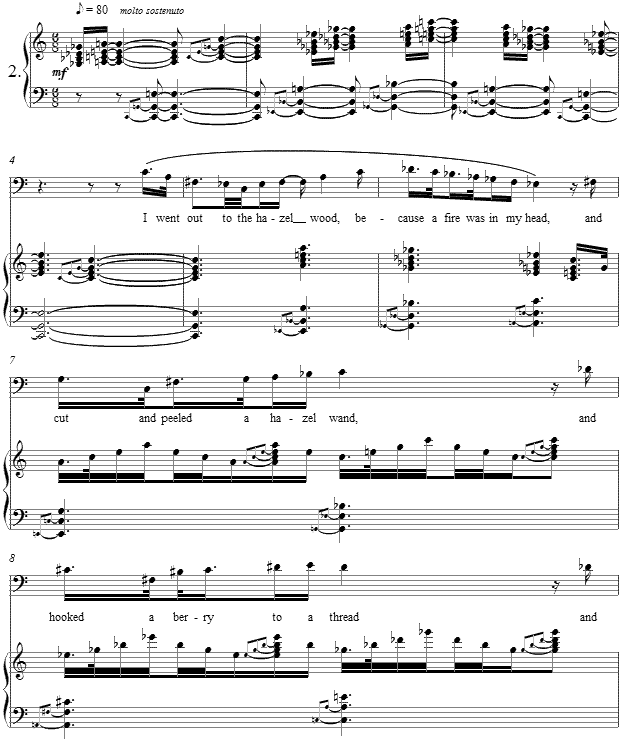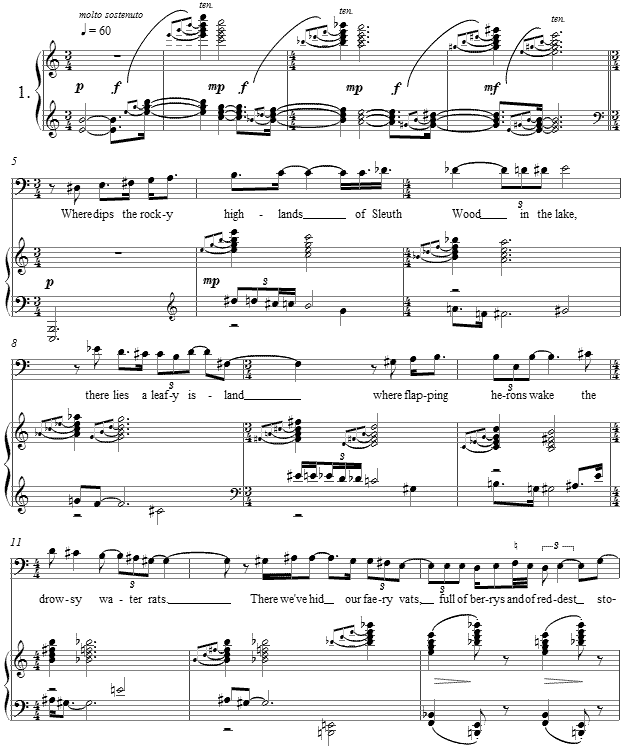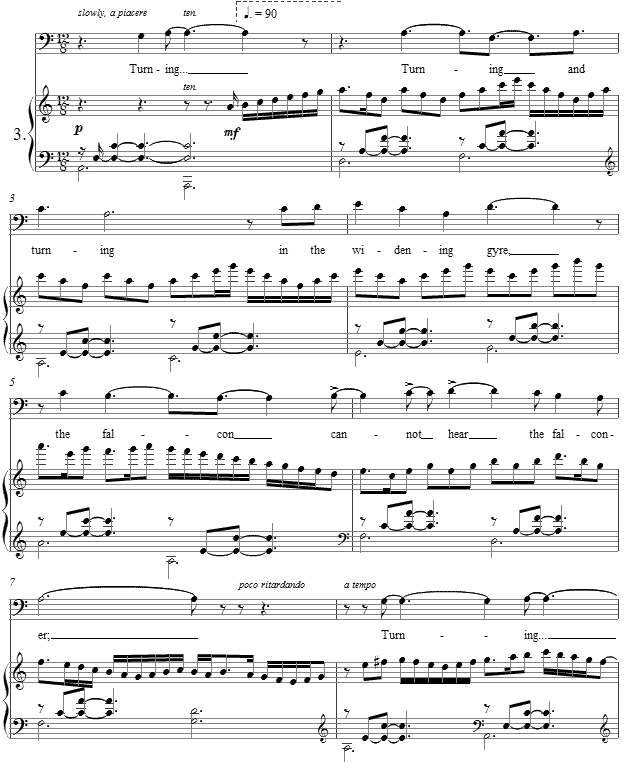Music and Texts of GARY BACHLUND Vocal Music | Piano | Organ | Chamber Music | Orchestral | Articles and Commentary | Poems and Stories | Miscellany | FAQs |
Three Magical Songs - (2005)
William Butler Yeats
Three songs for baritone and piano
for baritone Ned Barth
i. The Stolen Child [ 10 pages, circa 6' 10" ]
Where dips the rocky highland
Of Sleuth Wood in the lake,
There lies a leafy island
Where flapping herons wake
The drowsy water rats;
There we've hid our faery vats,
Full of berrys
And of reddest stolen cherries.
Come away, O human child!
To the waters and the wild
With a faery, hand in hand,
For the world's more full of weeping than you can understand.
Where the wave of moonlight glosses
The dim gray sands with light,
Far off by furthest Rosses
We foot it all the night,
Weaving olden dances
Mingling hands and mingling glances
Till the moon has taken flight;
To and fro we leap
And chase the frothy bubbles,
While the world is full of troubles
And anxious in its sleep.
Come away, O human child!
To the waters and the wild
With a faery, hand in hand,
For the world's more full of weeping than you can understand.
Where the wandering water gushes
From the hills above Glen-Car,
In pools among the rushes
That scare could bathe a star,
We seek for slumbering trout
And whispering in their ears
Give them unquiet dreams;
Leaning softly out
From ferns that drop their tears
Over the young streams.
Come away, O human child!
To the waters and the wild
With a faery, hand in hand,
For the world's more full of weeping than you can understand.
Away with us he's going,
The solemn-eyed:
He'll hear no more the lowing
Of the calves on the warm hillside
Or the kettle on the hob
Sing peace into his breast,
Or see the brown mice bob
Round and round the oatmeal chest.
For he comes, the human child,
To the waters and the wild
With a faery, hand in hand,
For the world's more full of weeping than he can understand.
ii. The Song of Wandering Aengus [ 5 pages, circa 3' 45" ]
I went out to the hazel wood,
Because a fire was in my head,
And cut and peeled a hazel wand,
And hooked a berry to a thread;
And when white moths were on the wing,
And moth-like stars were flickering out,
I dropped the berry in a stream
And caught a little silver trout.
When I had laid it on the floor
I went to blow the fire aflame,
But something rustled on the floor,
And some one called me by my name:
It had become a glimmering girl
With apple blossom in her hair
Who called me by my name and ran
And faded through the brightening air.
Though I am old with wandering
Through hollow lands and hilly lands,
I will find out where she has gone,
And kiss her lips and take her hands;
And walk among long dappled grass,
And pluck till time and times are done
The silver apples of the moon,
The golden apples of the sun.
iii. The Second Coming [ 8 pages, circa 3' 50" ]
Turning and turning in the widening gyre
The falcon cannot hear the falconer;
Things fall apart; the centre cannot hold;
Mere anarchy is loosed upon the world,
The blood-dimmed tide is loosed, and everywhere
The ceremony of innocence is drowned;
The best lack all conviction, while the worst
Are full of passionate intensity.
Surely some revelation is at hand;
Surely the Second Coming is at hand.
The Second Coming! Hardly are those words out
When a vast image out of Spiritus Mundi
Troubles my sight: somewhere in sands of the desert
A shape with lion body and the head of a man,
A gaze blank and pitiless as the sun,
Is moving its slow thighs, while all about it
Reel shadows of the indignant desert birds.
The darkness drops again; but now I know
That twenty centuries of stony sleep
Were vexed to nightmare by a rocking cradle,
And what rough beast, its hour come round at last,
Slouches towards Bethlehem to be born?Total cycle [ 23 pages, circa 13' 45" ]
W. B. Yeats
William Butler Yeats (1865-1939) was an Irish poet, dramatist and prose writer, and renown as one of the greatest English-language poets of the 20th century. He received the Nobel Prize for Literature in 1923. Between the Celtic visions of The Wanderings of Oisin and Other Poems (1889) which were filled with sad longings rooted in Irish mythology, and the intellectual, often obscure poetry of the 1930s, Yeats produced a great body of work. Early on in his career Yeats studied William Blake's poems, Emanuel Swedenborg's writings and other formative thinkers of his era.
"The Stolen Child" is harmonically rooted in the parallelism of triadic harmonies, linked together by chromatic melodic gestures, yet all related to the tonic minor. The measured arpeggios suggest quaint "faery" music as a musical counterpart to the mystic poetic image of the highland lake.
The refrain after the strophic story telling returns to a wail of the world, a rationale for the "faery" to steal the child. "...the world's more full of weeping than you can understand." In the final strophe the key slips down one half step, anchoring the sure and certain ending to this tale -- the successful theft of the child. "Come away, O human child! To the waters and the wild with a faery, hand in hand...."

"The Song of the Wandering Aengus" tells of "a glimmering girl with apple blossom in her hair who called me by my name and ran and faded through the brightening air."
The harmonic structure is rooted on an octatonic scale (repetitions of a whole step followed by a half step, yielding eight tones in the scale rather than diatonicism's seven). That structure remains rooted on C, as the seeming harmonic wandering never settles firmly on another tonal region, but continues its ambling back into a circle and inevitable return to its own beginning, a reflection of the moan of the Aengus who plans to find that "glimmering girl" and yet never shall.

"The Second Coming" is imbued with Christian religious images. The image of a "blood-dimmed tide" foretells some dire future, as the "vast image out of Spiritus Mundi" advances. Is this a reinterpretation of the Christian myth towards a darker side? When linked to the Book of Revelations' metaphors, Yeats' vision of the second coming seems quite consistent and ominous, yet inevitable in its "turning and turning." And for this, I chose to return to the open lines as the conclusion of the song setting, with its final dramatic cry, "Turn!"
Ned Barth
These poems were recommended to me by Ned over dinner in at the Concertatore restaurant in Verona, during the rehearsal period for our performances of Tristan und Isolde. Ned was a fine, supportive Kurvenal, and a charming colleague on and off stage. He sent me these poems after my return to Berlin, and, in only days, the settings imposed themselves into my thinking.
The score for Three Magical Songs is available as a free PDF download, though any major commercial performance or recording of the work is prohibited without prior arrangement with the composer. Click on the graphic below for this piano-vocal score.



